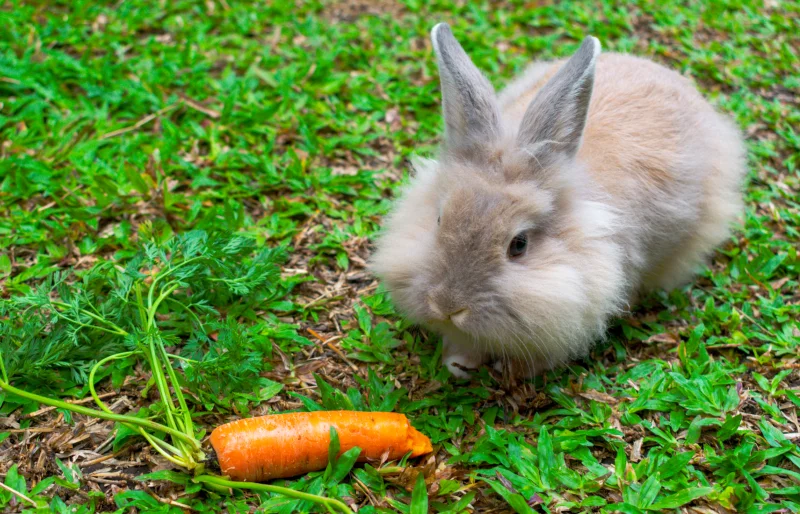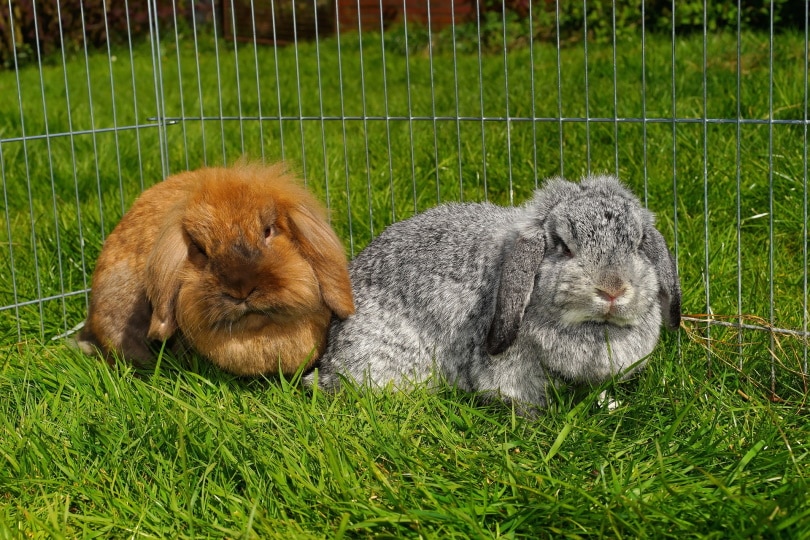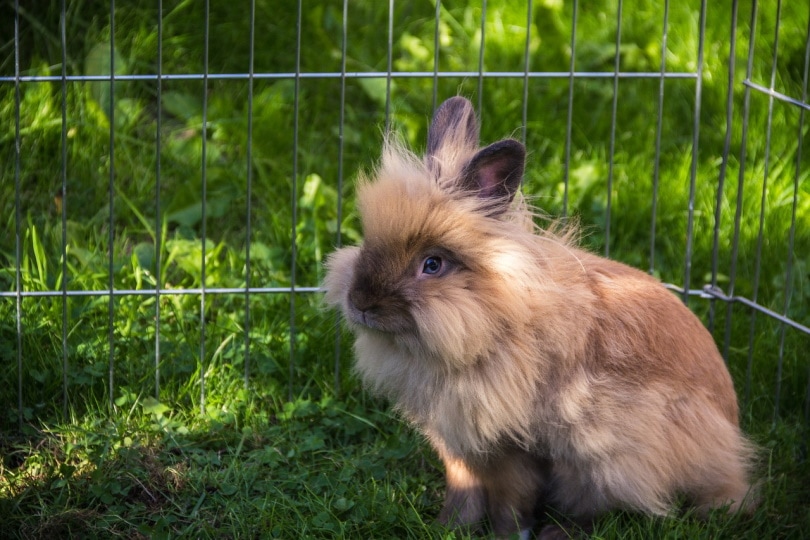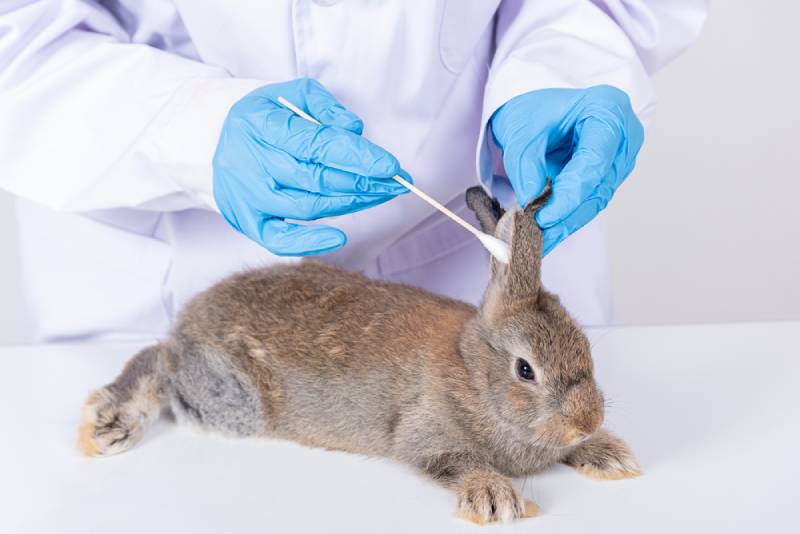
Click to Skip Ahead
Loved for their distinctive appearance, soft lion-like mane, and loving temperament, Lionhead rabbits are becoming increasingly popular. All rabbits need basic care to ensure they live a long and healthy life, and it’s up to you to know what is essential to help them thrive. Genes also play a role, so a rabbit’s breed will also determine its lifespan. A Lionhead Rabbit has an average lifespan of 7–10 years.
If you have adopted a Lionhead rabbit, read on to find out its lifespan and how you can help it live a long and healthy life.
What’s the Average Lifespan of a Pet Lionhead Rabbit?
Many factors can influence the lifespan of a pet Lionhead rabbit, as well as any other breed of rabbit. Generally, a Lionhead Rabbit has a lifespan of 7–10 years and may live for a longer or shorter period. Your rabbit will live longer if well cared for, so knowing how to care for a Lionhead properly will give it the best chance at a long life.

Why Do Some Pet Lionhead Rabbits Live Longer Than Others?
Your Lionhead rabbit’s genetics will play a significant role in its health, but these factors also affect its lifespan.
1. Nutrition
A Lionhead rabbit’s diet is likely the most essential factor in living a long life. A rabbit that receives a high-quality and well-balanced diet will typically live longer than a rabbit that is deficient in vital nutrients. Their diet should consist of about 70% of quality hay, such as Timothy hay, and the rest should be made up of fresh leafy greens. Pellets can also be served but should account for less than 5% of the diet.

2. Environment and Conditions
A Lionheads rabbit’s environment and living conditions will affect its health and lifespan. They need an environment that is peaceful, warm, and safe. The temperature should range from 60° to 75° F. They should have clean water and food bowls, as well as clean bedding and a clean litter box. Chew toys, tunnels, and platforms can enrich their environment, and rabbit-proofing your home can help keep your rabbit safe.
3. Housing
A rabbit’s housing will protect it from predators, so it will likely spend a lot of its time in its hutch. It should be large enough to allow the rabbit to hop and stretch, which is generally four times the size of the rabbit. It is recommended that your rabbit be housed indoors, where it’s safer from predators and protected from the elements. Their temperature can also be regulated more easily when kept indoors. Generally, Lionhead rabbits that are kept indoors tend to live longer than those housed outdoors because outdoor hutches are more vulnerable to infection, predators, and environmental conditions.

4. Size
Smaller rabbits tend to live longer than larger rabbits, so the size of your Lionhead rabbit will play a part in determining its lifespan. Therefore, if you own a dwarf Lionhead rabbit, it is likely to live longer than one that is larger.
5. Spayed or Neutered
A rabbit that has been spayed or neutered typically lives longer than intact rabbits. This is because it helps prevent life-threatening cancers such as uterine or testicular cancer from developing. Furthermore, a rabbit that gets pregnant can develop pregnancy toxemia,1 which can be fatal.

6. Grooming
Lionhead rabbits require more grooming than other breeds since they have longer hair. This can help prevent hairballs which can be fatal to rabbits as they cannot cough them up like other animals, which can result in an intestinal blockage.
7. Genes
Genes will play a role in your rabbit’s lifespan. Lionhead rabbits generally have longer lifespans than other rabbits, but knowing which health issues they may be predisposed to is important. This helps an owner pick up any early signs of a disease, and it also helps you know what diseases your rabbit can and should be vaccinated against.

8. Breeding
Where and how the rabbit is bred can affect its health and longevity. The breeder’s facilities should be clean, well-managed, and free from disease. You should find a reputable breeder that can give you information on the health history of your Lionhead rabbit.
9. Healthcare
Proper healthcare will significantly affect how long a rabbit lives. Your Lionhead rabbit should be taken to the vet every 6– 12 months for a routine checkup to help catch any illness or disease early and should also receive all the necessary vaccinations to prevent disease.
If any signs of illness show up, your rabbit should be taken to the vet immediately for correct care and treatment.
Your rabbit should have adequate exercise, mental stimulation every day, and a quality diet to ensure it is healthy and happy.

The 6 Life Stages of a Pet Lionhead Rabbit
Baby Stage
From about 2–4 weeks, a baby Lionhead rabbit will begin to open its eyes and rely on its mother’s milk for most of its diet. Hay can slowly be introduced at 3 weeks old. Between 4–6 weeks, they will become more aware of their surroundings, start weaning, and begin drinking more water. Hay will become an important food to help them gain weight and provide nutrients they usually get from their mother. By 6 weeks old, they are fully independent and can survive and mature without their mother.

Adolescence
A Lionhead rabbit reaches adolescence at 3–6 months. By this time, they have reached sexual maturity, and around 6 months is a good time to get your rabbit neutered or spayed.
Teenage stage
A Lionhead rabbit is considered a teenager between 6 months and 1 year. At 7 months, your Lionhead rabbit should be introduced to Timothy hay to give it the essential nutrients it needs. This is when your rabbit determines how it fits in with other animals.
Young Adult
Between 1–3 years, your Lionhead is considered a young adult and will spend a lot of time exercising and exploring. They may also be more curious, so it’s a good time to rabbit-proof your house.

Middle Age
At around 3–5 years old, your Lionhead may be less active and more affectionate. This is also the age that they start to trust you.
Old Age
From about 7 years, you will notice your rabbit calming down a lot more. Older rabbits also enjoy spending more time with their owners. This is also when you must pay attention to healthcare and routine veterinary checkups.
How to Tell Your Pet Lionhead Rabbit’s Age
By the time a Lionhead rabbit reaches a year old, it may be almost impossible to know its exact age. A rabbit’s features and activity level can help you guess its age, but there is no reliable way. One of the most reliable ways is assessing the toughness of their tissue while getting sterilized, especially in male rabbits. Testosterone will make the tissue tough over a few years, while a younger rabbit will have softer tissue.
Another way to help determine its age is by its heels. When a rabbit is young, its heels are generally pink and healthy; as they age, they begin to develop calluses. A more alert, healthy, and active rabbit may still be in its early stages, whereas a more reserved and calm rabbit may be in its later stages.
Conclusion
Lionhead rabbits generally have a lifespan of 7–10 years. However, many factors can determine how long they live. A rabbit that receives a well-balanced diet, a suitable environment, enough exercise and mental stimulation, and routine checkups with a vet typically lives longer.
Featured Image Credit: Chan Swan, Unsplash









